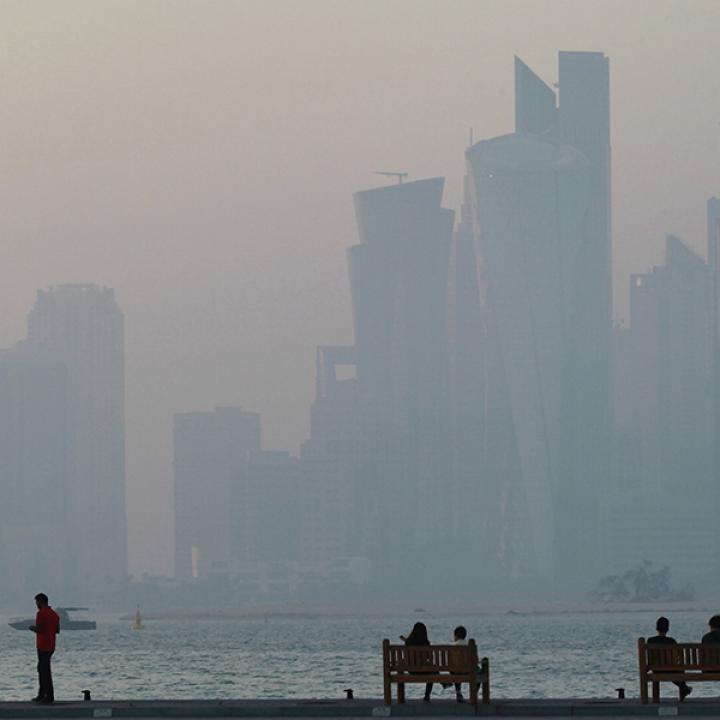
- Policy Analysis
- Policy Alert
Survey: Qatari Public Wants Compromise, Not Iran's Help

The findings strongly suggest that, to maintain his popularity, the emir should seek a middle-ground exit from Qatar's standoff with other Arab states.
As the crisis between Qatar and Saudi Arabia, Egypt, the United Arab Emirates, and Bahrain enters its fourth month, a timely, publicly available independent political survey among Qatar's roughly 300,000 citizens shows that they overwhelmingly want to settle this dispute in an amicable fashion. Eighty-one percent say they support "a compromise, in which all the parties make some concessions to each other" -- including 36 percent who feel strongly that way. This willingness to compromise is all the more striking since not a single one of the respondents supports the boycott against Qatar by the four opposing Arab states.
Equally surprising and significant are the mixed views of Qatar's citizens about the key issues in the intra-Arab dispute. First, regarding Iran, Qataris are solidly opposed -- by a margin of 79 to 16 percent -- to its current regional policies, despite charges by other Arabs that Qatar's royal family is too close to Tehran. Iran's regional proxies fare even worse in Qatari public opinion: both Hezbollah and the Houthis of Yemen get negative ratings from fully 90 percent of Qatar's adult population. And a narrow majority (53 percent) of Qataris even say that "the most important issue in this situation is to find the maximum degree of Arab cooperation against Iran."
By comparison, Turkey is wildly popular in Qatar today: 81 percent of respondents like Turkey's current Middle East policy, and 90 percent say good ties with Turkey are valuable to Qatar. The huge disparity between attitudes toward Turkey and toward Iran is both noteworthy and highly instructive, pointing clearly to the diplomatic outcomes to the crisis that would garner solid public approval or disapproval.
Also very unexpected and intriguing is the largely negative Qatari popular attitude toward another major bone of contention in this intra-Arab impasse: the Muslim Brotherhood. Although Qatar's government continues to support that organization, the country's citizens disapprove of it, by a margin of 56 to 41 percent. In sharp contrast, a third lightning rod in this international dispute, Qatar's Al Jazeera television channel, gets positive reviews from 74 percent of Qataris.
The U.S. role in the region is one more issue on which Qatari public opinion defies the conventional wisdom about "the Arab street." Even though a mere 11 percent express a positive view of current U.S. foreign policy, four times as many (42 percent) -- as in most other Arab countries polled lately -- also say it is "important for us to have good relations" with Washington. And nearly that proportion (35 percent) agree that, right now, "Arab countries need help from outside powers like the U.S. in order to overcome their differences." Remarkably, just 16 percent say the most useful gesture for the United States would be to "reduce its interference in the region."
To be sure, Qatar is no democracy, so public opinion there has, at most, an indirect impact on public policy. Yet even this absolute monarchy must pay some attention to popular attitudes. On a stop in Doha last week, the author witnessed all the heroic posters of Emir Tamim bin Hamad al-Thani adorned with this slogan: "O God, make our people love us as we love them!"
The findings from this unprecedented survey strongly suggest that, to maintain his popularity, the emir would do well to look for a middle-ground exit from Qatar's current crisis with other Arab states. Accepting some greater distance from Iran, and even from the Muslim Brotherhood, would seem to have the most popular appeal in a prospective compromise. And a substantial minority of the public would even be prepared to welcome U.S. diplomatic intervention in that direction.
On a methodological note, this survey is unique in comprising a truly random, geographic probability method, and face-to-face interviews, with a representative national sample of one thousand Qatari citizens. It was conducted in August 2017 by a leading professional Arab market research firm, with decades of experience in Arab Gulf societies. The demographics of the sample are also representative of the overall adult native population: 60 percent under age thirty-five; half in the capital city of Doha, one-quarter in neighboring al-Rayyan, and one-quarter elsewhere in the country; 90 percent Sunni and 10 percent Shia Muslim; and just one-fifth with any college education.
David Pollock is the Kaufman Fellow at The Washington Institute and director of Project Fikra. He was the chief U.S. government pollster for the Middle East in the 1980s and 1990s, and has continued to supervise extensive independent polling in the region ever since.



